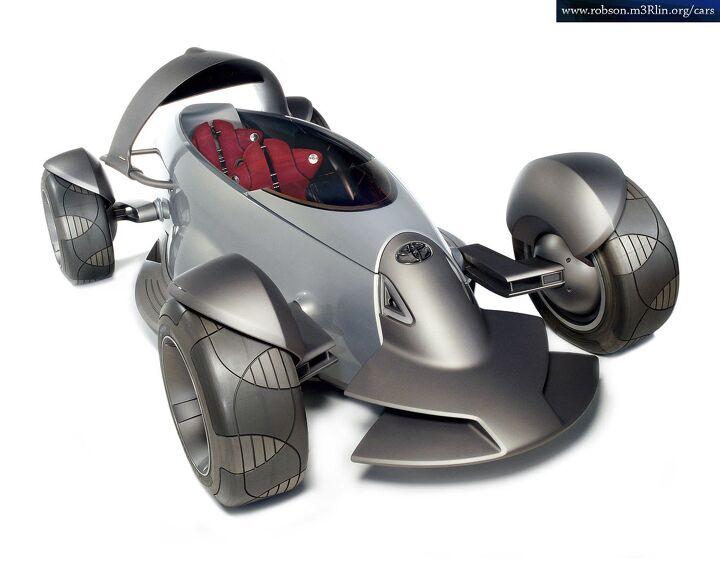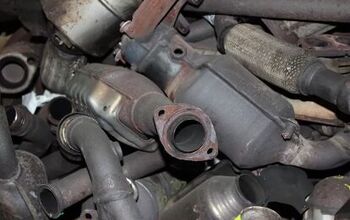Toyota And Daimler To Start Fuel Cell JV? Not Exactly

Toyota definitely keeps us on our toes. Last week, the tete-a-tete between Toyota and Tesla had the world speculating about an electric push by the world’s largest auto maker. That was last week. This week, it’s hydrogen.
Financial Times Deutschland (FTD) has it that Daimler and Toyota are planning a “far ranging cooperation with fuel cell vehicles.” The paper cites no sources, but says that “a joint venture is conceivable.” Today, The Nikkei [sub] has the same story, based on a report on the Kyodo wire, which cites the FTD. Who’s saying that only blogs crib from each other?
To counter the last accusation, we picked up the phone and called Toyota HQ in Tokyo. We had better luck than the FTD which had said that “neither Toyota nor Daimler had any comments.”
Toyota spokesperson Paul Nolasco said to TTAC that “Toyota has regular exchanges with Daimler and other companies about this technology.” As far as the rumored joint venture goes, “nothing has been decided.” In any case, it’s old news. “We had already talked before,” Nolasco said in a reference to a joint declaration of GM, Toyota, Honda, and Daimler of last September. The companies jointly said that “durability improvements and cost reductions may enable them to sell the zero-emission vehicles by 2015,” Bloomberg had reported, noting that “their plans clash with the U.S. government’s infrastructure priorities.” Which are in favor of electrification.
Development of hydrogen powered vehicles literally has been going on for ages. For more than 200 years, to be exact. An engine, running on an explosive mix of hydrogen and oxygen, was developed in 1806 by a Swiss inventor, and a car powered by said power train was rolling a year later, in 1807. It predated the gasoline engine by more than 60 years. In the 1990s, research into fuel cells intensified, and there is a long list of mostly experimental fuel cell vehicles by most larger car makers.
Hydrogen is not without problems. During its production, fossil fuels are often used, and CO2 is created. Then, there is the nastiness of a hydrogen infrastructure. California already has some 20 hydrogen filling stations for a few hundred experimental hydrogen cars – but if you venture away from Los Angeles, where most stations are clustered, you literally run out of gas.
As far as the plans for alternative energy vehicles go: Relax. Just like any other large auto maker, Toyota and Daimler are keeping their options open. A little research here and there doesn’t hurt. If there is green cred to be harvested along the way, even better. But don’t bet on the imminent death of the ICE.

Bertel Schmitt comes back to journalism after taking a 35 year break in advertising and marketing. He ran and owned advertising agencies in Duesseldorf, Germany, and New York City. Volkswagen A.G. was Bertel's most important corporate account. Schmitt's advertising and marketing career touched many corners of the industry with a special focus on automotive products and services. Since 2004, he lives in Japan and China with his wife <a href="http://www.tomokoandbertel.com"> Tomoko </a>. Bertel Schmitt is a founding board member of the <a href="http://www.offshoresuperseries.com"> Offshore Super Series </a>, an American offshore powerboat racing organization. He is co-owner of the racing team Typhoon.
More by Bertel Schmitt
Latest Car Reviews
Read moreLatest Product Reviews
Read moreRecent Comments
- Redapple2 Love the wheels
- Redapple2 Good luck to them. They used to make great cars. 510. 240Z, Sentra SE-R. Maxima. Frontier.
- Joe65688619 Under Ghosn they went through the same short-term bottom-line thinking that GM did in the 80s/90s, and they have not recovered say, to their heyday in the 50s and 60s in terms of market share and innovation. Poor design decisions (a CVT in their front-wheel drive "4-Door Sports Car", model overlap in a poorly performing segment (they never needed the Altima AND the Maxima...what they needed was one vehicle with different drivetrain, including hybrid, to compete with the Accord/Camry, and decontenting their vehicles: My 2012 QX56 (I know, not a Nissan, but the same holds for the Armada) had power rear windows in the cargo area that could vent, a glass hatch on the back door that could be opened separate from the whole liftgate (in such a tall vehicle, kinda essential if you have it in a garage and want to load the trunk without having to open the garage door to make room for the lift gate), a nice driver's side folding armrest, and a few other quality-of-life details absent from my 2018 QX80. In a competitive market this attention to detai is can be the differentiator that sell cars. Now they are caught in the middle of the market, competing more with Hyundai and Kia and selling discounted vehicles near the same price points, but losing money on them. They invested also invested a lot in niche platforms. The Leaf was one of the first full EVs, but never really evolved. They misjudged the market - luxury EVs are selling, small budget models not so much. Variable compression engines offering little in terms of real-world power or tech, let a lot of complexity that is leading to higher failure rates. Aside from the Z and GT-R (low volume models), not much forced induction (whether your a fan or not, look at what Honda did with the CR-V and Acura RDX - same chassis, slap a turbo on it, make it nicer inside, and now you can sell it as a semi-premium brand with higher markup). That said, I do believe they retain the technical and engineering capability to do far better. About time management realized they need to make smarter investments and understand their markets better.
- Kwik_Shift_Pro4X Off-road fluff on vehicles that should not be off road needs to die.
- Kwik_Shift_Pro4X Saw this posted on social media; “Just bought a 2023 Tundra with the 14" screen. Let my son borrow it for the afternoon, he connected his phone to listen to his iTunes.The next day my insurance company raised my rates and added my son to my policy. The email said that a private company showed that my son drove the vehicle. He already had his own vehicle that he was insuring.My insurance company demanded he give all his insurance info and some private info for proof. He declined for privacy reasons and my insurance cancelled my policy.These new vehicles with their tech are on condition that we give up our privacy to enter their world. It's not worth it people.”



































Comments
Join the conversation